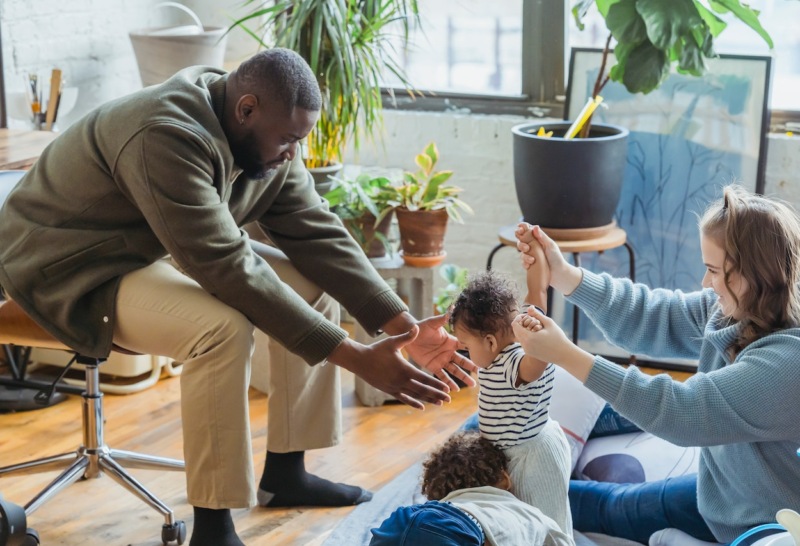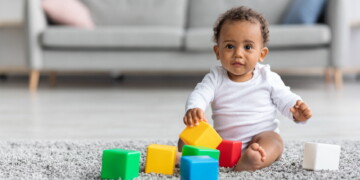As your little one continues to grow and explore the world, nurturing their developing mind becomes a delightful adventure.
Between 3 to 7 months of age, babies are like sponges, absorbing everything around them. As they giggle, babble, and grasp objects with those tiny hands, their curiosity blooms.
Therefore, creating an environment that promotes children’s cognitive development is essential. The inclusion of sensory play and vibrant visuals is vital in stimulating their curiosity and nurturing a passion for learning.
GUIDING PRINCIPLES:
| Engage the Senses: | Explore activities that stimulate your baby’s senses of touch, sight, sound, and more. |
| Encourage Exploration: | Create a safe environment for your baby to discover and interact with their surroundings. |
| Foster Interaction: | Promote social and emotional development through interactive play with caregivers and peers. |
| Support Cognitive Milestones: | Introduce age-appropriate toys and games that challenge and stimulate their growing mental abilities. |
| Embrace Creativity: | Encourage imaginative play and provide opportunities for self-expression through music, art, and storytelling. |
Eight Ways to Nurture Your Baby’s Mind With Creative Ideas for Stimulation (3-7 Month Old)

1. Read Together
Immerse your little one in the captivating world of stories and imagination by reading together daily. Choose colorful and interactive books that are suitable for their age, filled with vibrant pictures and engaging textures.
As you read aloud, vary your tone and expression to keep your baby intrigued. Point to the pictures, and let them explore the books with their tiny hands.
Reading together not only enhances language skills but also nurtures a strong emotional bond between you and your baby. So snuggle up, let their imagination soar, and cherish these precious moments of shared storytelling.
2. Sing and Make Music
Fill your baby’s world with melodic wonders as you sing songs and create music together. Your voice is a powerful tool for engaging their auditory senses and fostering a love for rhythm and melody.
Explore a variety of tunes and rhymes, from lullabies to playful jingles, to keep their interest piqued.
You don’t need to be a professional singer; your baby will cherish the sound of your voice, no matter how sweet or silly. So, let the music flow and watch as their eyes light up with joy and curiosity.
3. Teach Baby the ABCs
Embark on a fascinating alphabet adventure with your little one. Introduce the ABCs through colorful books, interactive toys, and even simple sing-along songs.
Repetition is key, so make it a part of your daily routine. Point out letters in their environment, and celebrate every small achievement. As they start recognizing letters, their language and cognitive skills will flourish, setting the stage for future learning milestones.
4. Learn About Numbers
Turn everyday activities into fun-filled numerical explorations. Count their tiny fingers and toes, toys, or snacks during mealtime. Engage in counting games, and use your fingers to show them numbers visually. As they grow familiar with numbers, they’ll grasp the concept of quantity and basic mathematical skills. Remember, it’s not about complex equations at this stage, but rather, the joy of discovering numbers all around them.
5. Describe What You’re Doing
Keep your baby in the loop by describing your daily activities. Talk to them about what you’re doing as you prepare meals, change diapers, or play games.
Use simple, descriptive words to build their vocabulary and understanding of the world. Engaging them in conversations, even if they can’t respond yet, enhances their listening and language abilities. Plus, it strengthens the bond between you and your inquisitive little one.
6. Show Baby How Things Work
Babies are naturally curious about the world around them. Fuel their fascination by showing them how everyday objects function. Demonstrate simple actions like opening and closing doors, turning on lights, or pushing buttons. Let them touch and explore safe household items like pots, pans, or musical instruments. By understanding cause and effect, they’ll develop problem-solving skills and a thirst for knowledge
7. Play with Toys That Have Interesting Sounds, Textures, and Colors
Select toys that ignite your baby’s senses. Opt for ones with intriguing sounds, various textures, and vibrant colors. Rattles, soft plush toys, and sensory balls are excellent choices.
These toys encourage exploration, stimulate their senses, and promote motor skills development. Rotate toys to keep the excitement fresh and offer new opportunities for learning and play.
8. Get Outside Together
Nature is a playground for young minds. Take your baby outdoors to experience the wonders of the world. Feel the grass beneath their feet, watch leaves sway in the wind, or listen to birds chirping. Nature offers endless sensory stimuli and sparks their curiosity about the environment.
Whether it’s a stroll in the park or a trip to the beach, outdoor adventures provide valuable learning experiences and unforgettable bonding moments.
What is the Significance of Creative Stimulation?
As a parent, you can help your baby’s brain development by providing them with creative stimulation. Engaging in activities that promote imagination and cognitive growth can set the foundation for a lifetime of learning and exploration. Here’s what you need to know:
Nurtures Cognitive Development
A well-nurtured cognitive development sets the stage for a bright and curious mind. To foster optimal mental growth in your baby, consider these essential practices:
- Create a safe and stimulating environment that encourages your baby to explore and interact with their surroundings.
- Introduce age-appropriate toys and activities that challenge their growing mental abilities, promoting problem-solving and critical thinking.
- Engage their senses with colorful visuals, interactive textures, and sounds, igniting their curiosity and enhancing sensory perception.
- Engage in conversations, read together, and introduce new words to build a strong foundation for language and communication.
- Sing and dance together, as music and movement stimulate both the brain and body, fostering creativity and expression.
Nurturing cognitive development from an early age lays the groundwork for a lifelong love of learning and intellectual growth.
Builds a Strong Emotional Bond With Caregivers
Fostering a strong emotional bond between caregivers and babies is a cornerstone of healthy development. Here are essential ways to nurture this precious connection:
- Skin-to-Skin Contact: Embrace skin-to-skin cuddles, providing comfort and reassurance to your baby while promoting feelings of security and trust.
- Respond to Their Cues: Pay attention to their cries, coos, and gestures, responding with love and care, which communicates that they are valued and understood.
- Eye Contact and Smiles: Engage in frequent eye contact and share warm smiles, as these simple gestures lay the foundation for meaningful emotional connections.
- Gentle Touch: Incorporate gentle touch during feeding, diaper changes, and playtime, strengthening the emotional bond through physical closeness.
- Quality Time: Spend quality time together, engaging in activities that promote positive interactions and a sense of emotional closeness.
Creating a loving and supportive environment is key to cultivating a deep and meaningful connection that will positively impact their well-being throughout life.
The Bottom Line
In a nutshell, nurturing your baby’s mind through creative stimulation is vital for their holistic development. Children who engage in play, language learning, and imaginative interactions lay the foundation for cognitive growth, social skills, and self-expression.
Embrace these practices to unlock the boundless potential within your little one and set them on a path of lifelong curiosity and learning.
Andrea Gibbs is the Content Manager at SpringHive Web Agency, where she helps create content for their clients’ blogs and websites. She is currently a blog contributor at Montessori Academy, a blog dedicated to helping parents with the ins and outs of parenting children within the Montessori tradition. When she isn’t writing, she enjoys spending time with her family and her dog.




























